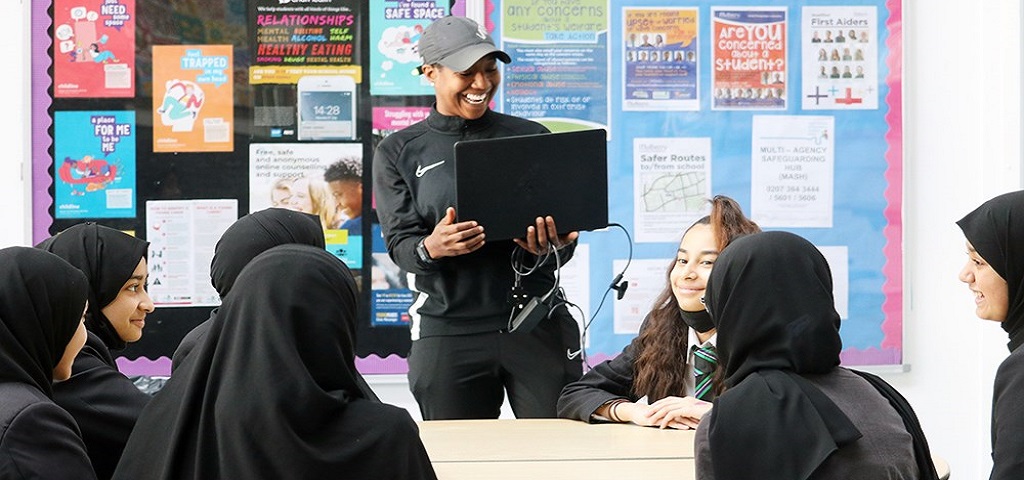Young people don’t want pity and platitudes, they want genuine employment opportunities
on May 21, 2021By Sonia Rossetti,
Managing Director, Regional Head, Corporate Affairs, Brand and Marketing, Europe and Americas

Last spring the coronavirus pandemic gathered pace across Europe, prompting governments to bring in lockdown restrictions in order to slow and stop the spread of the virus.
And while the most severe health outcomes have, in the main, been gravest amongst older members of the population, the economic impact has fallen disproportionately on the young. The initial blow was swiftly dealt: within the first three months of the pandemic, a third of employees aged 18-24 in the UK were either furloughed or lost their jobs, according to think-tank the Resolution Foundation. With the contraction in the jobs market across Europe, young people leaving education may have nowhere to go for employment..
Our COVID-19 response
Like many other corporates, when the pandemic hit we, at Standard Chartered, recognised that we had a duty to support those around us who were struggling. For our part, we made available a USD50 million relief and economic recovery fund to help those in our communities affected by COVID-19.
Young people who have been doubly disadvantaged by COVID-19 are the focus of the economic recovery part of the relief fund. Our efforts, powered by Futuremakers by Standard Chartered, the Bank’s global initiative to tackle inequality, will provide opportunities for young people in our communities through education, employability and entrepreneurship programmes.
We are supporting community projects that prepare young people to gain, regain and sustain employment, either directly through training and upskilling or indirectly by supporting small and medium-sized businesses adapt to the new COVID-19 reality, thereby creating wealth and job opportunities. Our actions are intended to help level the playing field for those for whom the pandemic has compounded existing inequalities – those who were already in low-income communities, where resources, employment and opportunities for social mobility were scarce before, and who find the odds further stacked against them now.
The urgent need to preserve the future of the workforce
Young people provide a pool of diverse talent with skills and values that are critical to the long-term sustainability of business. But lack of access to jobs, especially those from low-income communities, is not a problem that we can ignore. The latest Resolution Foundation report on the impact of COVID-19 reiterates that the longer people spend out of employment, the more likely they are to be unemployed in the future. The earlier this happens in your working life, the more this effect and loss of earnings is compounded over the longer term.
So preserving a pathway into work in the first place, and helping young people into employment sooner rather than later is a top priority. Those in low-income communities – of which there are several right on the doorstep of our Global head office in the City of London – will be the most affected by the reduction of community programmes and early careers provision. In 2021, up to one in four young people will be unemployed, with young people who live in poverty twice as likely to be out of work, according to charity Street League, one of the partners we work with to engage young girls into employment through sport. We must therefore redouble our efforts to compensate for the damage the pandemic has caused.
Alongside improving our internal hiring processes, we are supporting local delivery partners to further amplify our impact in the community. We will be reaching more than 8,500 young people through a selection of projects funded by the Standard Chartered Foundation. In France, Ireland, and Poland we are working with the Enactus experiential learning platform to create a social entrepreneurship curriculum for students and enterprises that will boost employability and drive digital skills. In Germany and Turkey, Youth Business International, Kiz and Habitat Association are helping us deploy targeted advice and virtual mentoring and coaching programmes to businesses led by young entrepreneurs who have been impacted by the pandemic.
Our continuing commitment to tackling gender inequality
Our efforts in supporting employability also specifically address gender inequality. This is a cause we have long supported through our Goal programme – Futuremakers’ flagship education programme – which empowers young women with the confidence, knowledge and skills they need to be economic leaders in their families, schools and communities.
We recognise that many women have also been disproportionately impacted by the pandemic for a variety of reasons – from the challenges of balancing work and caregiving responsibilities to the impact of job losses in industries such as tourism, hospitality and retail, where women make up the majority of the workforce. According to Eurofound, family responsibilities prevented almost twice as many women (24%) than men (13%) from giving the time they wanted to their job during the pandemic. The same report found that women aged 18-34 were more likely to lose their job in the wake of the first wave of the pandemic (11%, compared to 9% of young men).

Women are also more likely to face the need to change jobs as a result of COVID-19. In France, Germany, and Spain, the increase in job transitions required due to trends influenced by COVID-19 is 3.9 times higher for women than for men according to McKinsey. As such, we need to think carefully about the opportunities we are supporting to make sure they are a real solution, not a sticking plaster. That is why the programmes we are running in the UK are targeted to provide sustainable employment opportunities in sectors that should see increased demand in the years to come: STEM and healthcare.
We have recently announced a partnership with award-winning social enterprise Stemettes, which will include the sponsorship of a Cyber Certification Academy. This Academy will provide qualifications that will improve employment outcomes and engage more young women and non-binary people in an industry where they are profoundly underrepresented – currently just 21% of the UK’s STEM workforce is female. We also announced the launch of the Futuremakers ‘Health Citizens Programme’ with St John Ambulance, which will support 1,700 18-25 year olds from some of the most deprived areas in the UK with essential employability and leadership skills, and equip them for potential future employment opportunities in the health and social care sectors, and beyond.
A rallying cry to our fellow corporates
Young people entering or re-entering employment right now face unprecedented challenges: the effects of an economic recession alongside workplaces that have been transformed by lockdowns, social distancing and travel restrictions. Without face-to-face contact and readily available informal watercooler moments to establish a network in the workplace, they face an uphill struggle to acclimatise in their new roles – if they can find work at all.
Generation Covid will be impacted by the events of the last 14 months for years to come, and those who were already facing considerable challenges now find themselves being doubly disadvantaged. The only way we can help to reset the balance is by taking action. From big donations to small, targeted programmes, it can all make a difference. But it needs to be done now.
